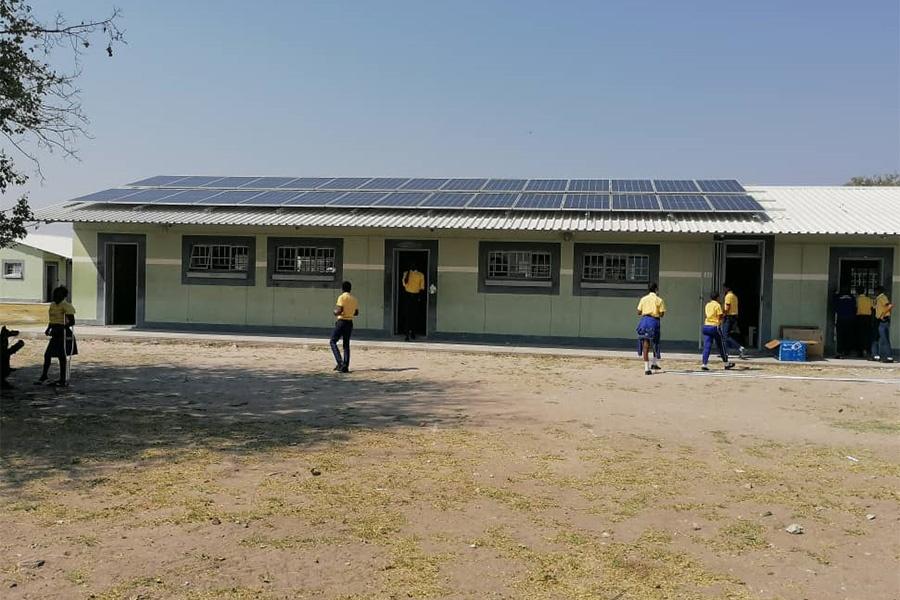Pathway to Renewable Off-Grid Community Energy for Development (PROCEED) Project

Project duration: 2019 - 2023
In Namibia, more than half of the country’s rural population has no access to electricity. In many parts of the country, connecting households to the national grid is neither technically nor economically feasible. The lack of access to electricity remains one of the biggest obstacles impeding efforts to reduce poverty and increase industrialization. The German-Namibian collaborative project “PROCEED” examines options for using off-grid hybrid energy systems to establish an efficient and sustainable power supply in Namibia that is based on renewable sources of energy.
Funding institutions
The project is funded by the German Federal Ministry of Education and Research (BMBF) and forms part of the BMBF’s CLIENT II initiative.

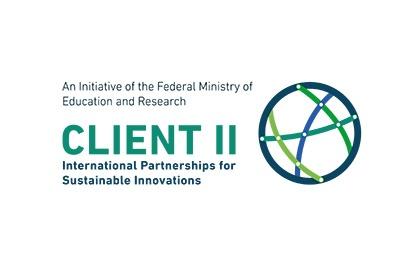
Objectives of the project
Identify suitable designs / models for PV-based mini-grids in underserved regions that are
- technically up-to-date,
- economically viable,
- easy to operate / maintain and
- appropriate for the local needs and social context.
Implement a holistic strategy to ensure the sustainability of these systems and to make rural people “first class citizens”
- Develop recommendations for action for the acceptance and promotion of off-grid power supply systems (at user and decision-maker level)
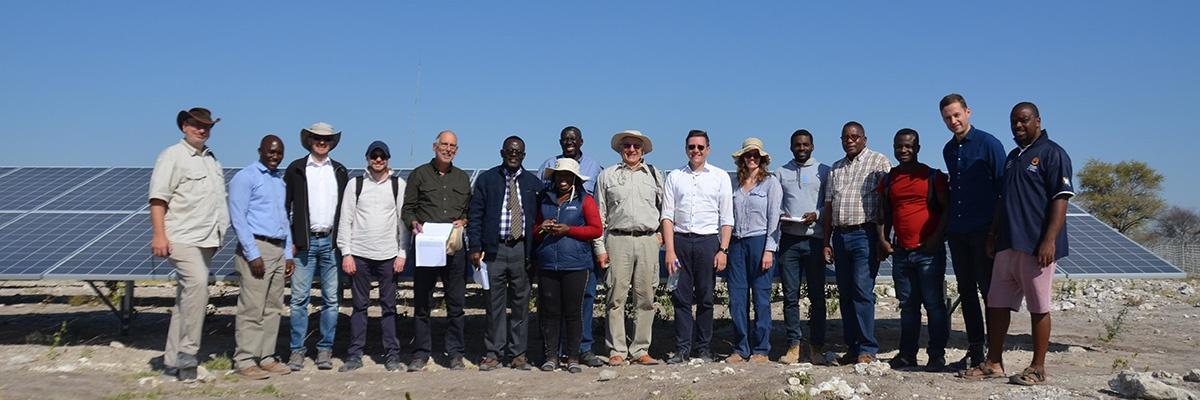
Project partners
German Partners: Technische Hochschule Ingolstadt (THI), Asantys Systems GmbH, IBC Solar AG, University of Applied Sciences Neu-Ulm (HNU), University of Bayreuth (UBT)
Namibian Partners: Alensy Energy Solutions (Pty) Ltd, Central North Regional Electricity Distributor (CENORED), Hanns-Seidel-Foundation Namibia (HSF), Namibia Energy Institute (NEI), Namibia University of Science and Technology (NUST), Namibia Ministry of Mines and Energy (MME), Renewable Energy Industry Association of Namibia (REIAoN), SADC Centre for Renewable Energy and Energy Efficiency (SACREEE)

Installation of a PV-battery-system on the roof of the Tsumkwe Secondary School
As part of the Work Package “Mini-Grid Technology”, THI together with CENORED and the Namibian solar company DIS Engineering designed and installed a PV-battery system on the premises of the Tsumkwe Secondary School. This new system with a PV capacity of 26kWp shall serve as a decentralized expansion of the undersized mini-grid. Apart from stabilising the mini-grid and serving the school’s electricity needs, the PV-battery-system will provide relevant data for the researchers to analyse the interaction between the main mini-grid and the decentralised new system.
Publications
Desirable or debatable? Putting Africa's decentralised solar energy futures in context
Presentations & Recomendations Final PROCEED Conference
Mini-Grids in Communities: Results & Recommendations
Economics of Mini-Grids: Results & Recommendations
Mini-Grid Technology: Results & Recommendations
Sustainability of Mini-Grids: Results & Recommendations
PROCEED Recommendations for Action
Background Information
Sustainable energy supply
Due to its low population density and a sparsely distributed settlement structure, Namibia faces particular challenges when it comes to supplying remote areas with electricity. Despite the abundant supply of solar, wind, and biomass resources, only 20 percent of the national power grid’s energy mix currently comes from renewable sources.Renewable energy-based hybrid systems, consisting of regenerative power sources, a battery system, and fossilpowered backup generators, are already available. But despite the falling costs of such technologies, the majority of rural communities in Namibia cannot afford to pay for power from these systems.
The “PROCEED” project aims to improve the lives of people living in remote areas of Namibia who do not have access to a reliable energy infrastructure. For this purpose, suitable options will be developed for designing energy supply models based on renewable sources of energy and hybrid energy systems.
The German-Namibian project consortium will carry out an analysis of the energy demand and the possibilities for establishing an energy supply in rural areas of Namibia. The project’s main priority is to conduct case studies on three existing off-grid systems, also known as “mini-grids”. An analysis of these off-grid hybrid energy systems will be used to identify models for using renewable energies that fit in with local needs and societal context. They also use the latest technology, are economically viable and easy to maintain, and therefore making them sustainable in the long term. Concepts for optimizing the process of rural electrification will be developed in close cooperation with the local partners.
Innovation through interdisciplinarity
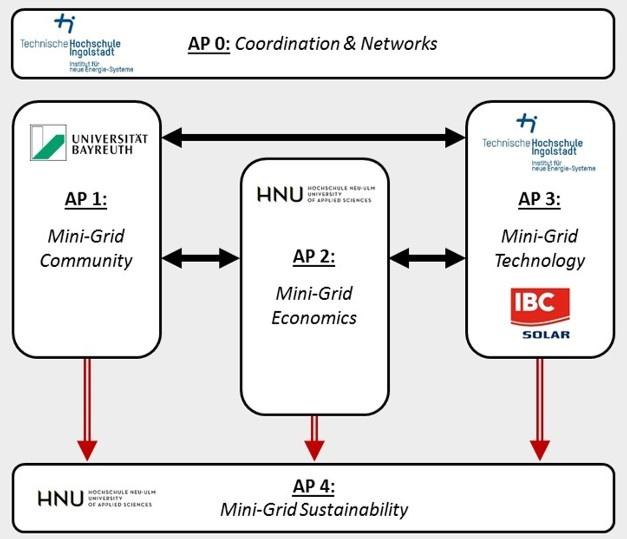
Linking the technological, social, economic, and environmental aspects of energy supply is central to the “PROCEED” project. To ensure effective implementation, the project explores various aspects of using mini-grids such as mini-grid communities, mini-grid economics, mini-grid technology, and mini-grid sustainability. The project activities are coordinated and controlled by the Technische Hochschule Ingolstadt. Researchers at the University of Bayreuth will conduct interviews and data surveys to analyze geographic and socio-cultural conditions (mini-grid communities) for increasing power generation through off-grid hybrid energy systems. On the topic of mini-grid economics, the University of Applied Sciences Neu-Ulm investigates how to set up a tariff and payment system to cover the costs of decentralized hybrid energy systems. It will also develop suitable business models for the commercial use of electricity produced. Determining consumption profiles and building loads, as well as the optimal design of hybrid systems based on renewable energies, are the main objectives of the mini-grid technology research, which is led by the Institute of New Energy Systems at the Technische Hochschule Ingolstadt. By formulating practical recommendations for action and developing training program concepts based on the outcomes of these three core research areas, the fourth area – mini-grid sustainability – will enable the sustainable utilization of the project’s results at national and supra-regional levels.
Technology transfer and networking
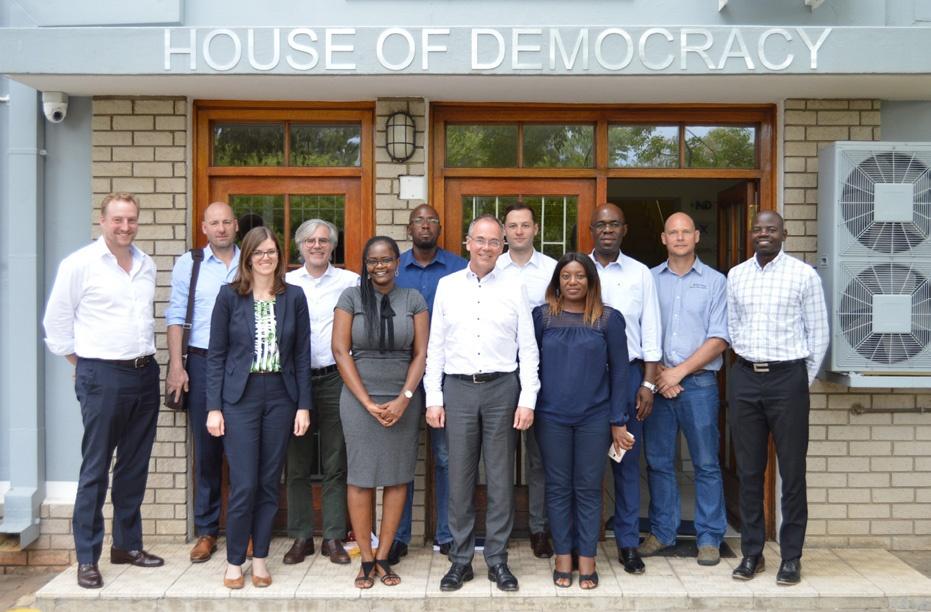
“PROCEED” not only promotes the transfer of technology in the field of renewable energies, but also strengthens the network of relevant stakeholders at the German, Namibian and regional levels in the Southern African Development Community (SADC) region.
All project activities are carried out in close cooperation between German and local partners. Organizations such as the Namibia Energy Institute, its corporate partner Alensy Energy Solutions Ltd, and the Renewable Energy Industry Association of Namibia are able to contribute their experience from previous electrification projects. At the same time, ongoing communication with national institutions such as the Ministry of Mines and Energy and regional institutions such as the SADC Center for Renewable Energy and Energy Efficiency will ensure that the project is in line with relevant policy agendas. This means that the results will become a valuable resource – for example, for the Hanns Seidel Foundation Namibia – for promoting renewable energy-based hybrid energy systems in the long term.
At a higher level, “PROCEED”‘s interdisciplinary approach plays an important role in the development and implementation of technologies, system solutions, and services in the field of energy supply in rural Africa.
Impressions from the PROCEED Field Trip in April 2022
Impressions from the Final PROCEED Conference in Windhoek in September 2023

